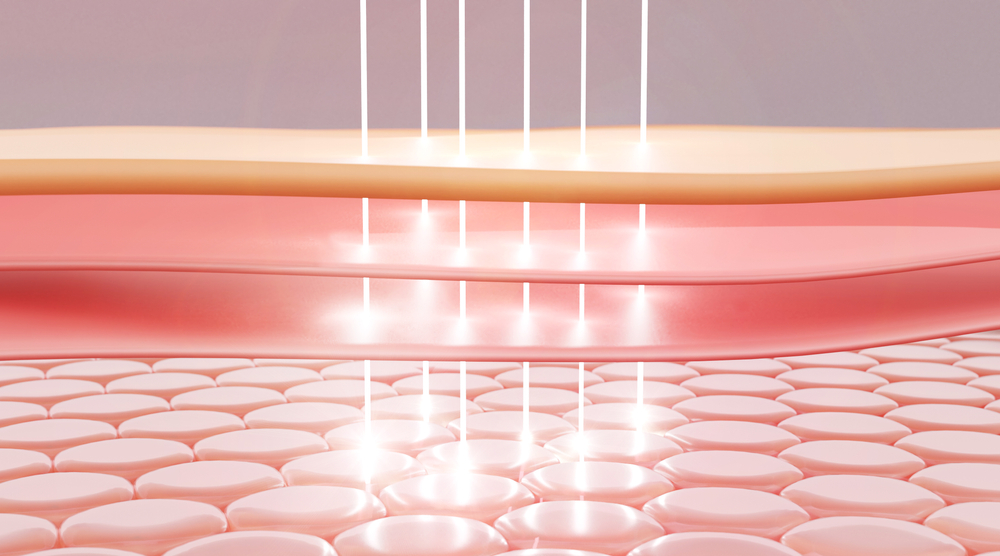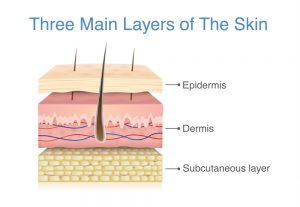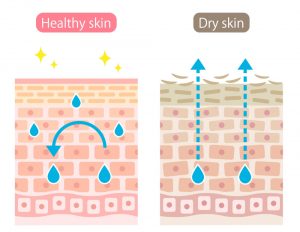
WORDS LIM TECK CHOON
 FEATURED EXPERT FEATURED EXPERTDR FELIX YAP BOON BIN Consultant Dermatologist Sunway Medical Centre |
MISCONCEPTION 1
DRY SKIN IS NOTHING SERIOUS.
Dr Felix Yap Boon Bin points out that this is not always true.
“Lack of water or skin dehydration will cause dry skin to peel, crack, irritate, itch and become sensitive,” he explains. “If we scratch the itch, it may lead to damage of the skin’s epidermis, causing it to become thinner or eventually recede away.”
Our skin consists of three layers: the epidermis, the dermis, and the subcutaneous layer. Click on the image for a larger, clearer version.
“When the epidermis is compromised, germs and dust can penetrate into the second layer of the skin or dermis, causing inflammation, in addition to causing other skin problems, such as eczema and psoriasis,” Dr Felix shares.
A comparison of healthy and dry skin. Click on the image for a larger, clearer version.
What causes dry skin?
Dr Felix says that being under the hot sun for a long period of time can cause dry skin.
Being in an air-conditioned room for long periods of time can also be a factor, as air conditioning can cause the skin to dry.
However, many cases of dry skin are due to genetic factors. “Some individuals are born without a protective skin layer, causing their skin to be easily dehydrated,” Dr Felix says. Therefore, it is possible for someone to develop this condition without spending much time under the sun or air-conditioning.
Additionally, the use of improper skincare products can lead to dry skin. Dr Felix cites the frequent usage of body scrubs or soaps with a higher pH level (pH above 7) as an example.
| If you spend much time under the sun or in air-conditioned rooms, Dr Felix recommends, applying moisturizers regularly to ensure that the skin is healthy and has a good level of hydration. “However, if dryness is at a serious level, it is recommended to use medicated moisturizers,” he says. |
MISCONCEPTION 2
ANY SKIN MOISTURIZER WILL DO.
Not true.
“For dry skin types, oil-based moisturizers are more suitable because the oil content will moisturize the skin and reduce itching or peeling,” Dr Felix explains.
He adds: “Individuals with oily skin can choose oil control moisturizers to prevent acne growth.”
For sensitive skin, Dr Felix recommended the use of specialized moisturizers, products without fragrance or chemicals produced by certified medical brands.
Hence, he reminds everyone to identify their own skin type before choosing their skincare products, in order to ensure that these products are suitable for long-term use.
MISCONCEPTION 3
DRINKING A LOT OF WATER AND EATING VEGETABLES REGULARLY CAN HELP THE SKIN STAY HYDRATED
Research has proven that this assumption is inaccurate.
“Lack of water in the body will certainly affect the quality of the skin, but drinking a lot of water at one time does not help the skin to stay hydrated,” Dr Felix elaborates.
“Also, consuming a lot of vegetables does not necessarily help to hydrate the skin. Healthy and hydrated skin requires a balanced diet, which includes a variety of nutrients and not just vegetables,” he adds.
BONUS: DR FELIX’S TIPS TO PROTECT YOUR SKIN
“The water content in our skin will also decrease as we age,” Dr Felix reminds us. “The protective layer will become thinner and its efficiency to trap water will also become lower when we reach between 40 to 50 years old.”
Therefore, he offers some tips to help us take care of our skin in order to avoid skin problems in the future.
- Sleeping for 7 hours a day and have a consistent bedtime, preferably before 12 midnight.
- Lead an active lifestyle to improve the immune system. Low immunity can cause skin diseases such as eczema.
- Use moisturizers before going to bed, especially in rooms with air conditioning.
- Apply sunscreen before leaving the house.







